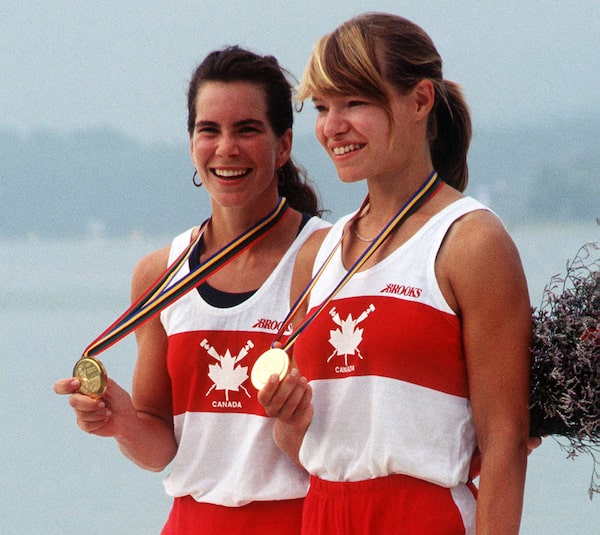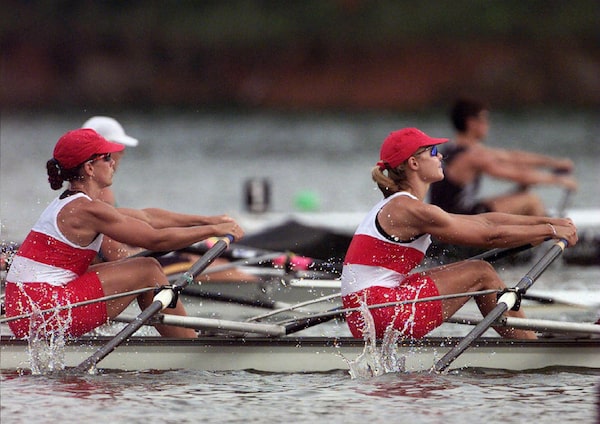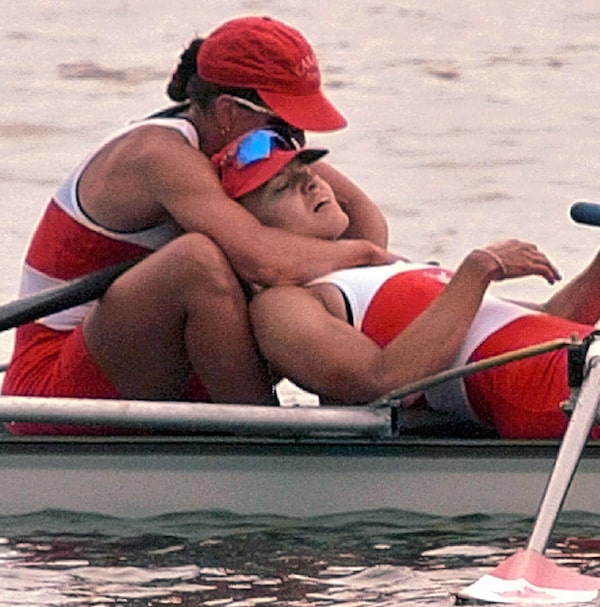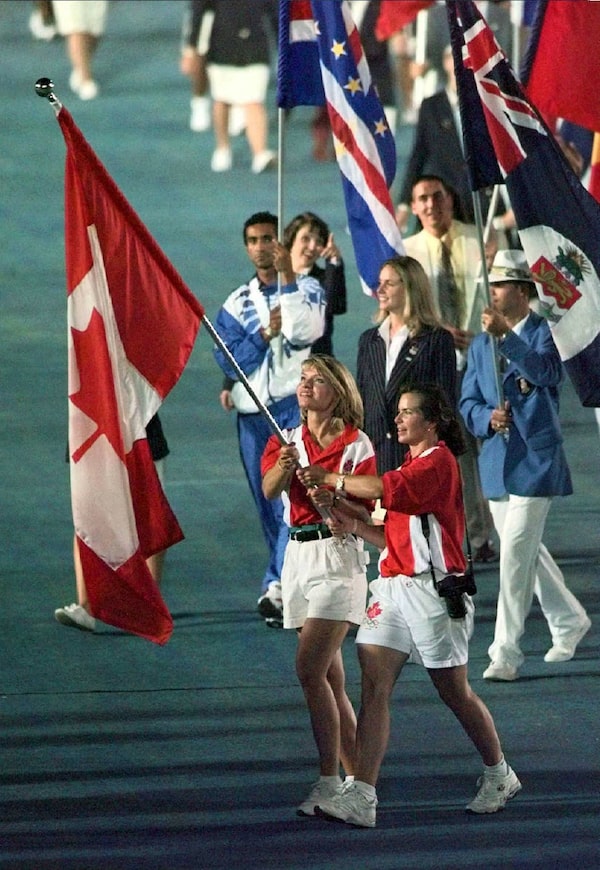
Canada's Marnie McBean, left, and Kathleen Heddle celebrate a gold-medal win at the 1992 Olympic Games in Barcelona.TED GRANT/COC / The Canadian Press
The rowers Kathleen Heddle and Marnie McBean were known as the Dynamic Duo and the Odd Couple. After they became the first Canadians ever to win three Summer Olympic championships, they were called the Golden Girls.
Ms. Heddle, who has died at 55, six years after receiving a cancer diagnosis, was one of Canada’s greatest Olympians, a determined athlete who quietly inspired a generation of girls to take up a demanding, exhausting sport.
The two won gold medals in pairs and with the crew of eight at the 1992 Olympic regatta on the Lake of Banyoles, about 95 kilometres northeast of Barcelona, Spain. They became nationally famous four years later by winning a thrilling double sculls race on Lake Lanier outside Atlanta. That victory gave Canada its first gold medal of the Centennial Olympics and came only hours after a terrorist bomb at a downtown park killed a woman, casting a pall on the Games.
The pair became as famous as hockey players, stopped on the street by strangers seeking autographs, wooed by sponsors and advertisers. Almost as suddenly, they returned to ordinary lives, a deliberate decision by Ms. Heddle.
“We turned down cereal boxes and a running-shoe sponsorship,” Ms. McBean said recently. “We turned down the cover of a national magazine. Kathleen said she wasn’t in it for that reason. I was: ‘We’re not?!’”
The gregarious Ms. McBean was the strategic plotter in the bow of the double sculls, while Ms. Heddle was the reserved powerhouse at stroke. Many mistook Ms. Heddle’s quiet demeanour as an expression of shyness, though her teammates insist she was merely a calm person in no need of the spotlight.
“When she chose to share what she was thinking,” Ms. McBean said, “she was sage.”
Her great success as a rower was all the more unexpected coming as it did only after she was introduced to the sport two months before her 20th birthday.
Kathleen Joan Heddle was born on Nov. 27, 1965, in the smelter city of Trail in British Columbia’s West Kootenays region. She was the fourth and youngest child born to the former Marilyn Helson Buchanan, a university-educated dietitian from Moose Jaw, and Duncan Walker Heddle, a geology engineer originally from Nelson, B.C., who did mineral exploration for Cominco Ltd. (now Teck Resources). The couple, who met on a blind date, moved the family 600 kilometres west to Vancouver before the girl’s second birthday.
At Kitsilano Secondary, Kathy, as she was known then, was active in band, travelled with her Grade 12 history class to Egypt and played volleyball, basketball and softball.
She enrolled at the University of British Columbia, her father’s alma mater, where she played volleyball on the junior varsity team for two seasons while also serving as team manager. She was crestfallen when told she was not good enough to make the varsity squad.
She was registering for third-year courses inside War Memorial Gymnasium on campus when a rowing coach spotted her in a lineup. Drew Harrison prowled the gym like a stable owner checking horseflesh before a claim race, seeking broad shoulders and sturdy hindquarters. The Heddles trace their lineage to the windswept Orkney archipelago off the northeastern tip of Scotland, and in Kathleen’s wide, round face and blond hair her own mother saw “a little bit of Viking blood.” At 5-foot-11 (180 centimetres), Ms. Heddle’s V-shaped torso offered the classic physique for a rower.
She was placed with the university’s novice squad, which practised in rows of two on a barge outfitted with sliding rowing seats, riggers and oars. The coach patrolled a runway in the middle of the barge, like the commander of a slave ship. The rookies needed training before taking to the water aboard a shell large enough to hold eight rowers and a coxswain.
“Maybe after two or three weeks of that [barge training],” Ms. Heddle said in 1996, “they actually put you in an eight. It’s really tippy, and you’re getting hit in the back by the oar behind you because no one has their timing right.”
She knew she had found her calling when she could feel the shell respond as her strokes pushed through the still waters of Burnaby Lake.
“I had this feeling I could be good at it,” she said. “I guess you have an instinct that this is it, you’ve actually found the sport that’s meant for [you].”
Her strength, flexibility, determination and aerobic capacity soon caught the attention of Canada’s national team. In her second season, she was paired with Kirsten Barnes of West Vancouver and they won the women’s coxless pair at the World University Games in Zagreb, Yugoslavia. Two months later, they represented Canada at the 1987 Pan American Games in Indianapolis even though they were the country’s B-team, as the top squad was resting for that year’s world championships. An early sprint by the Canadians helped them claim gold ahead of their American rivals, one of whom briefly blacked out from dehydration during the race.

Ms. McBean and Ms. Heddle racing during the 1996 Atlanta Olympics.John Schults/REUTERS
After failing to make the 1988 Olympic team, Ms. Heddle completed her psychology degree while continuing to train and compete. In time, she mastered the technical aspects of the sport, combining finesse with brute strength and a focused mind to become a formidable competitor.
In the preparations before the 1992 Olympics, the national coaching staff paired her with Ms. McBean, “like an arranged marriage,” the latter said, and it was a relationship not without its difficulties. Over time, each went separately to coach Al Morrow to insist on a new partner. Instead, he persuaded each in turn to stick with the plan, as he felt the strengths of each compensated for the weaknesses of the other. Besides, Ms. McBean acknowledged recently, “Kathleen was never going to get louder, and I was never going to get quiet.”
Ms. Heddle was once asked whether she considered her teammate to be a co-worker, a friend or a sister.
“We’re foremost business,” she said. “At a regatta, that’s the first thing on the list. We get along well, and we’re friends, too. That comes out more in the offseason or when we haven’t seen each other in a while. And sisters because we don’t always get along.”
At the Rotsee Regatta in Lucerne, Switzerland, in July, 1991, the two were surprised to find themselves leading a race against the reigning world champions from Germany. Since it was only a semi-final and they would be wise to conserve energy for the final, Ms. McBean called for a slowing of the stroke rate. Ms. Heddle could not bring herself to do so and continued rowing at a furious pace. They would go on to win the event.
“That race at Lucerne has always been a bit of a joke between the two of us,” Ms. Heddle once told Wendy Long of the Vancouver Sun.
A month later, on a flood-relief channel called the New Danube in Vienna, the Canadians led from the start to defeat the German pair by a boat length to became world champions. The next day, they helped the eights also win a world championship. Ms. Heddle would retire with three gold medals and two silvers at world championships.
A year later, they won their first two Olympic gold medals at a regatta in which their triumphs were overshadowed by Silken Laumann’s dramatic bronze-medal win less than three months after she suffered a devastating leg injury in a training collision on the water.
Ms. Heddle retired after the 1992 Olympics to work as a technical assistant at Vancouver Community College. She was lured back onto the water by Ms. McBean. After competing as sweepers, with both hands on one oar, the two were now going to compete as scullers, each using two oars – a change in discipline.
As they crossed the finish line on Lake Lanier in 1996, a third Olympic gold medal now theirs, the two were so exhausted they were unable to exchange words. Heddle leaned back with her open right hand, which McBean grasped, as they both gasped for air.

Ms. McBean hugs Ms. Heddle after they won the gold medal in the women's double sculls Olympic competition at Lake Lanier, Ga., on July 27, 1996.David J. Phillip/The Associated Press
They raced again the next day in quadruple sculls with Diane O’Grady and Laryssa Biesenthal, finishing in third place to earn a bronze medal.
At the closing ceremonies of the Atlanta Olympics, Ms. Heddle and Ms. McBean were the Canadian flag-bearers.
Ms. Heddle retired from the sport once again, while her partner continued until a back injury ended her competitive career. (Seven months ago, Ms. McBean was named Canada’s chef de mission for the pending Olympic Games in Tokyo.)
Ms. Heddle worked in sports administration and started a family. “I don’t picture myself as glamorous,” she told sports historian Fred Hume. “I want [my] accomplishments to be foremost.” While training for the Atlanta Olympics, she stored her possessions with her mother. Her haul of medals, including Olympic golds, were kept in a jumble inside an ordinary shoe box in a closet.
Ms. Heddle died on Jan. 11 at the family home in the leafy Vancouver neighbourhood of Kerrisdale. She had been diagnosed with breast and lymph-node cancer followed by melanoma and brain cancer.
She leaves Mike Bryden, her husband of 20 years and a former member of Canada’s national rowing team. She also leaves their children, Lyndsey and Mac. Her death came two years less a day after her mother’s passing at age 91. Her father died in 1990. She also leaves a brother and two sisters.
Ms. Heddle was inducted into the Canadian Olympic Hall of Fame in 1994, followed three years later by induction into Canada’s Sports Hall of Fame. She has also been named to the UBC Sports Hall of Fame (2002) and the B.C. Sports Hall of Fame (2003), which had earlier inducted her as a member of the 1992 Olympics coxed-eights crew. In 2016, she was named to the Rowing Canada Hall of Fame, which had been established the previous year.
Ms. Heddle was named to the Order of British Columbia in 1997. Two years later, she was awarded the prestigious Thomas Keller Medal by the International Rowing Federation for her achievements and her sportsmanship. Only two other Canadians – Ms. McBean and Ms. Laumann – have ever won the sport’s highest honour.
In October, 2019, she joined former Olympic teammates including Ms. Barnes and Ms. McBean in the women’s senior eights for rowers older than 50 at the Head of the Charles Regatta. The Old Gold crew from the Victoria City Rowing Club defeated 38 other crews in completing the 4.8-kilometre course on the Charles River outside Boston in 18:14.139, more than seven seconds faster than the runner-up crew. It was Ms. Heddle’s final race. She bowed out a champion.

Ms. Heddle, left, and Ms. McBean carry the Canadian flag at the closing ceremony of the 1996 Olympics.Nick Didlick/REUTERS